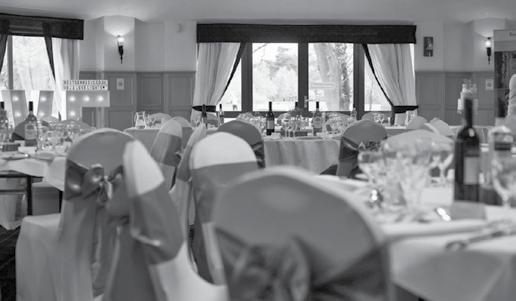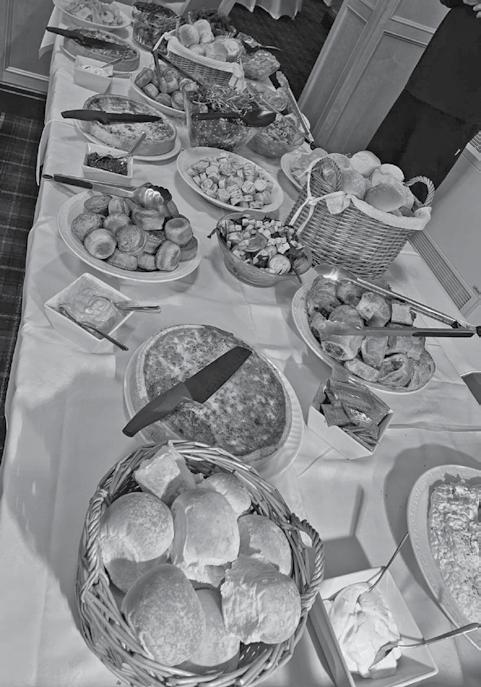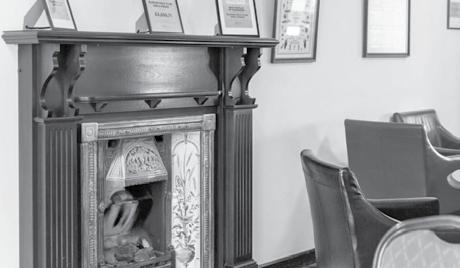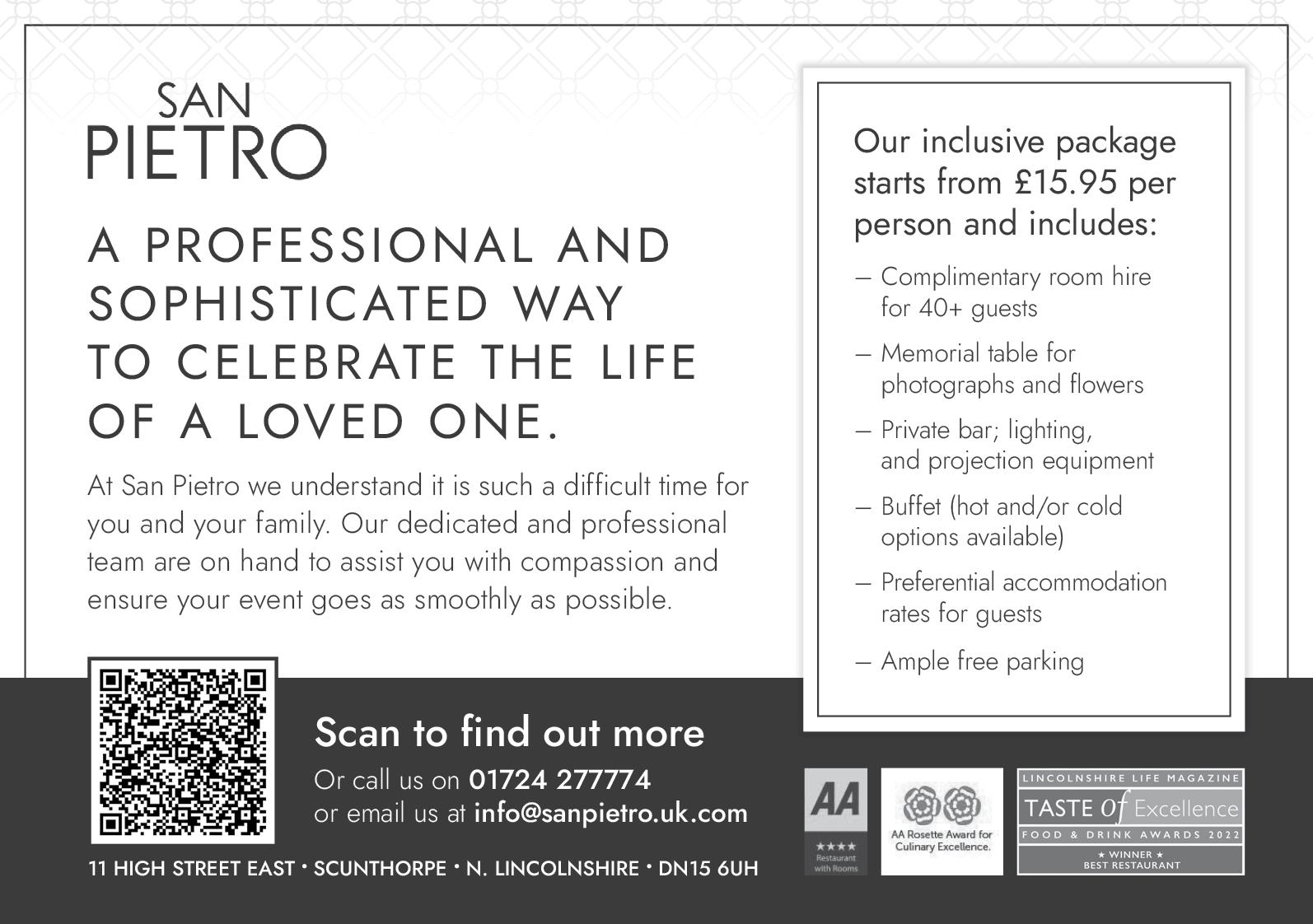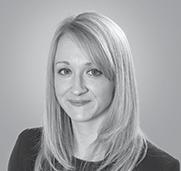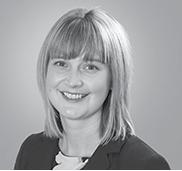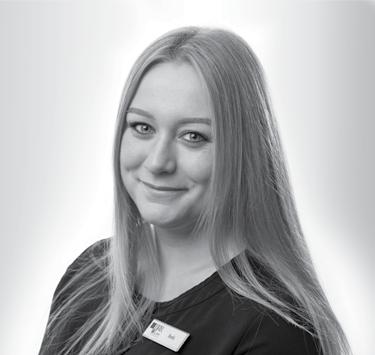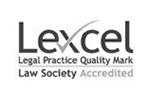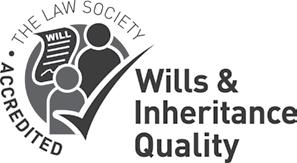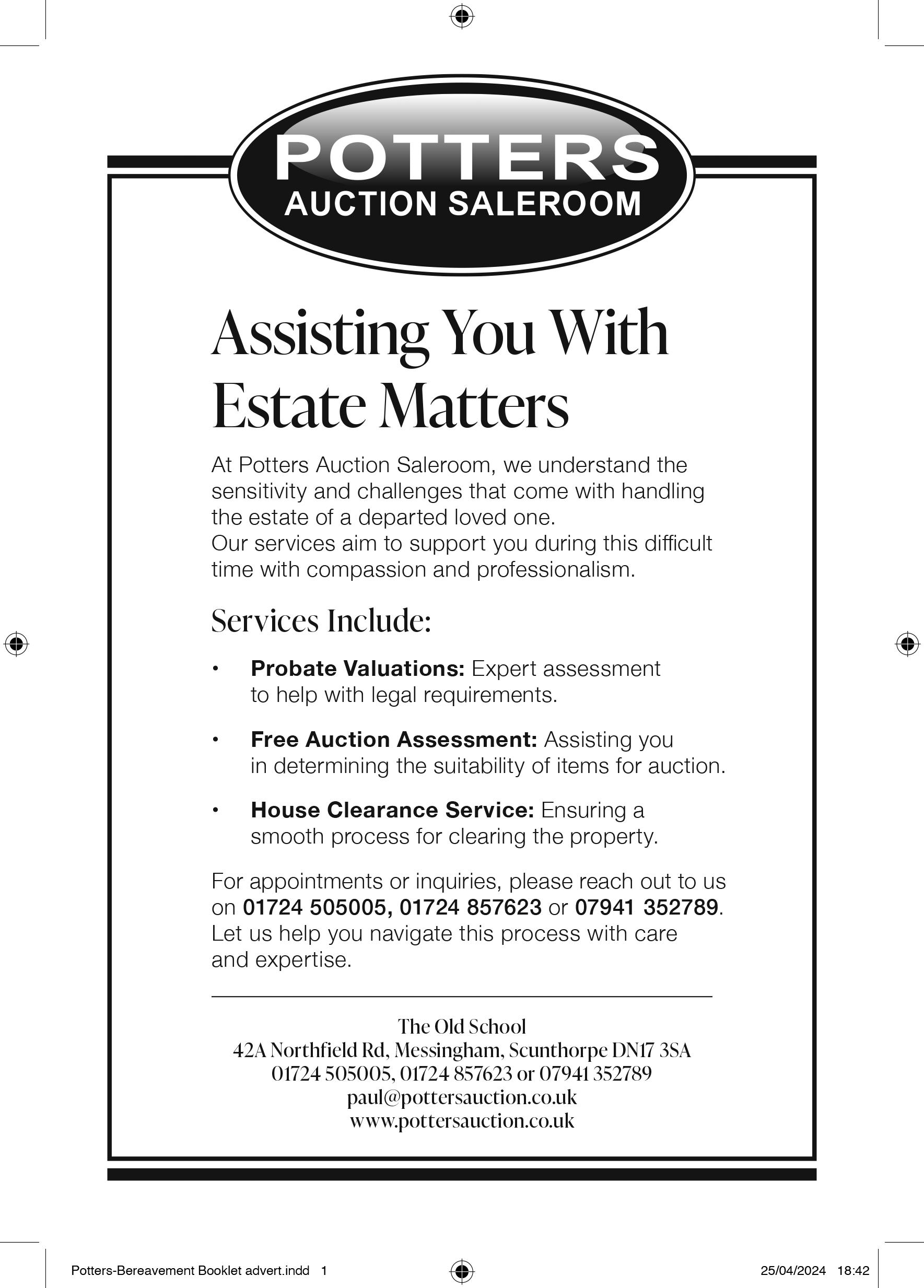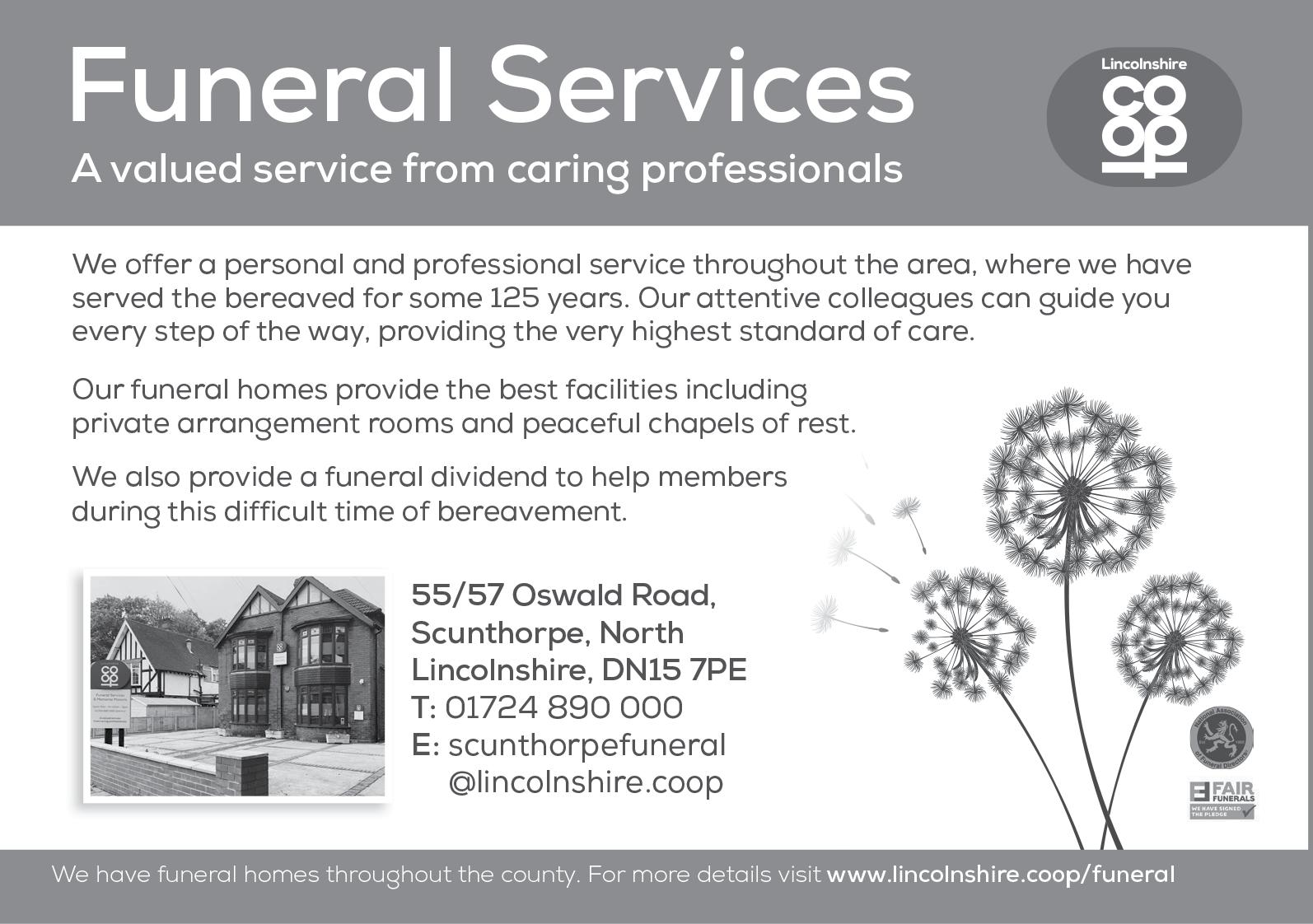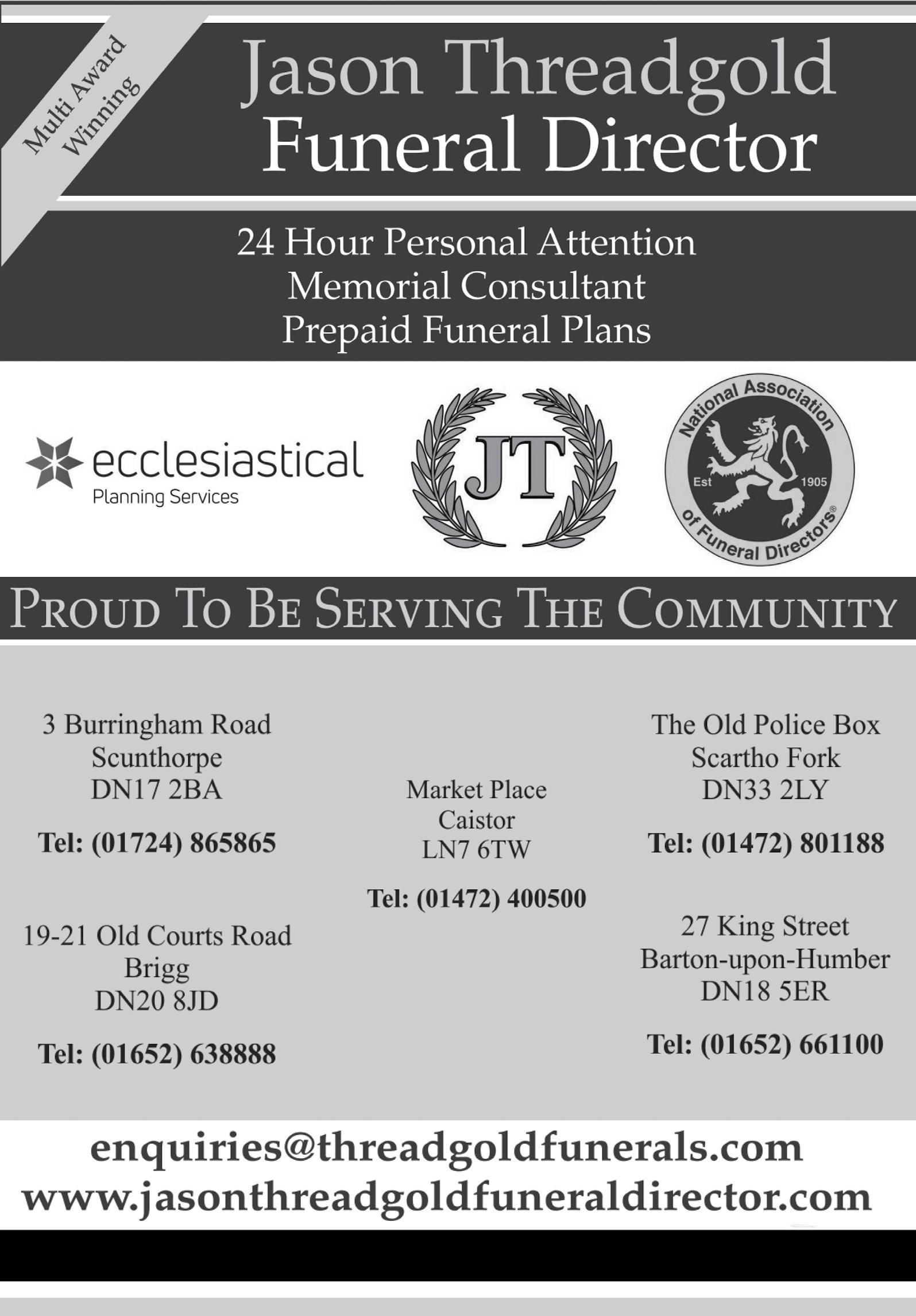




You can shed tears that they have gone, Or you can smile because they have lived.
You can close your eyes and pray that they’ll come back, Or you can open your eyes and see they’ve left.
Your heart can be empty because they can’t be seen or heard, Or you can be full of the love you shared.
You can turn your back on tomorrow and live yesterday, Or you can be happy for tomorrow because of yesterday.
You can remember them and only that they’ve gone, Or you can cherish their memory and let it live on.
You can cry and close your mind, be empty and turn your back, Or you can do what they’d want, smile, open your eyes, love and go on.

We are sorry for your loss and offer our condolences to you and your family. If you think we can help you in any way, please do not hesitate to contact the Hospice.
If you wish to speak to a member of staff at Lindsey Lodge please contact us on 01724 270835 and ask to speak to a member of the nursing team.
We understand that this is a very distressing and emotional time for you and also that there are many things that you will need to organise. We hope the guidance offered in this booklet will make things easier for you.
All members of the Hospice team will try to give any practical help and advice. We may not know the answers to all problems, but we will always try our best to give the correct information and direct you to people who can help.
You can also get practical help from funeral directors, family doctors, solicitors, welfare officers and personnel departments at work places or your minister of religion.
You may feel that you want more than practical advice, and that you need to talk with someone who is outside your immediate family or with other people who have been through a similar experience.
Staff at the Hospice are available to listen and help. We do provide a Family Support team who are always there to care. You may feel that coming back to the Hospice is too painful at first. If this is the case, support can always be given over the telephone.
Following your bereavement we will contact you to enquire how you are and if further support from our Family Support team may be of help.
A service of remembrance is held once a year, for patient’s families who are known to the Hospice. A member of the team will contact you to discuss this in the future.
When a death has occurred at the Hospice a medical certificate, stating the cause of death (MCCD), will be issued by the Hospice doctors unless there is to be a postmortem. This will be sent directly to the Registrars office.
The nurse who has been caring for the deceased will inform you when this is ready.
The death must be registered at the Registrar of Births, Marriages and Deaths within five working days of the death occurring, (unless there is to be a post-mortem). Details of the Registrars’ offices, telephone numbers and a map are in this booklet. An appointment will need to be made to see the Registrar.
At your appointment you will need, if possible:
• The deceased’s medical card
• The deceased’s birth and marriage certificate (if applicable)
You should tell the registrar:
• The date and place of death
• The deceased’s last (usual) address
• The deceased’s first names and surname (and the maiden name where appropriate)
• The deceased’s date and place of birth (town if born in the UK, and town and country if born abroad)
• The deceased’s occupation and the name and occupation of their spouse
• Whether the deceased was getting a pension or allowance from public funds
• If the deceased was married, the date of birth of the surviving widow or widower ~ 3 ~
The registrar who registers the death will give you:
• A Certificate for Burial or Cremation (known as the Green Form) unless the coroner has given you an Order for Burial (form 101) or a Certificate for Cremation (form E). These give permission for the body to be buried or for an application for cremation to be made. It should be taken to the funeral director so that the funeral can be held.
• A Certificate of Registration of death (form BD8). This is for social security purposes only. You should read the information on the back of the certificate. If any of it applies, fill in the certificate and show it to your social security office.
• Leaflets about benefits and income tax for widows, where appropriate.
The Death Certificate is a certified copy of the entry in the death register. The Registrar will give you a copy of the Death Certificate but there will be a charge.
You may need extra copies of the certificate for any pension claims, insurance policies, savings bank accounts and premium bonds.
What happens if the death is referred to a Coroner?
The role of the Coroner is to establish the cause of death in specific circumstances, for example, those that are sudden, unexpected or are the result of certain medical conditions. Referrals are infrequent and are not a cause for concern, although they may cause some delays as the Medical Certificate of Cause of Death cannot be issued until the Coroner’s enquiries have been completed.
It may be several days before the Coroner’s certificate is issued. Once this has been done, you can then register the death.
In a small number of cases, where the cause of a person’s death is unclear, sudden, suspicious or related to employment the Coroner will organise an inquest.
An inquest is an inquiry to establish who the deceased person was and how, when and where they died. It also gives relatives the chance to ask questions about the person’s care and subsequent death.
In this situation, the Coroner will issue an interim death certificate to allow the next of kin to deal with the person’s estate. When the inquest has been concluded the next of kin will be told how to obtain the death certificate.
The Coroner’s office can be contacted on 01472 324020. If you would like to talk to someone about a referral to the Coroner the staff at the Hospice can explain why the referral has been made and will explain the process to you.
Office: Carlton St, Scunthorpe DN15 6TX (01724 298555)
How do I arrange the funeral?
If the person has died at Lindsey Lodge Hospice we can contact the Funeral Director of your choice who will collect the deceased and take them to the funeral home.
You do not have to wait until you have the death certificate to contact the Funeral Director. Most Funeral Directors are open seven days a week and they will be happy to visit you at home to give you guidance about the funeral arrangements.
They can help you to decide where the person’s body is to rest until the funeral (for instance at the funeral home or at the family home), whether you wish to have a funeral service and what form that should take. You will need to decide whether the person is to be buried or cremated. The person may have left instructions about this in their will or end of life care plan. If not, the nearest relative or executor will normally make this decision.
The Funeral Director will discuss any extra requests with you that you may have for the funeral.
If you have a person in mind who you wish to lead the funeral, such as a religious leader, ask the Funeral Director to find out when they are available before making your arrangements.
Alternatively, you do not have to hold a religious service. If you wish you can design your own non-religious service involving a secular celebrant if desired.
You need to be aware that when you arrange a funeral you are responsible for paying the bill. You may wish to contact a number of Funeral Directors to compare their prices and what they can offer you. They should be able to give you a written quote detailing all their fees. Lindsey Lodge Hospice will provide details of local Funeral Directors.
Funeral payments can be recovered from the deceased person’s estate and banks have to release money to pay for the cost of funerals when asked to do so.
You may be entitled to some assistance towards the cost of a relative’s funeral expenses depending on the individual’s personal circumstances, age, finances and national insurance contributions. The website www.gov.uk provides general information.
Two phone numbers which may be helpful are:
• Bereavement Service 0800 731 0469 will help to navigate through the benefits system
• Bereavement Forecast Department 0800 731 0175 will discuss service and advise entitlements if you are in receipt of certain benefits or if you are the partner or spouse of someone who died whilst employed (depending on National Insurance contributions and other conditions). Your local Jobcentre Plus can advise you about this and your Funeral Director will have some information which may be helpful.
Most Funeral Directors are members of the associations listed at the end of this section, along with other information and advice that may help you to arrange the funeral.
Information and advice about funerals:
National Association of Funeral Directors
0121 711 1343
www.nafd.org.uk
The National Society of Allied and Independent Funeral Directors
0345 230 6777
www.saif.org.uk
Advice on particular religious and secular services can be found from the local association itself or from their websites, or at the website below.
Interfaith Seminary www.interfaithfoundation.org
A national organisation that can provide representatives to help plan and lead tailor-made ceremonies that may or may not have a spiritual element.
Do’s and Don’ts
Don’t hide your feelings; try to be open about your feelings.
Don’t make any major life changes while you are still grieving. Give yourself plenty of time to think about changes you may wish to make and discuss these plans with family and friends.
Don’t neglect yourself. Try to eat well and get plenty of rest. Taking exercise is also important.
Don’t enter into any financial or legal arrangements unless you fully understand them.
Don’t hurry yourself to overcome your grief. There is no fixed time that it takes to get over bereavement.
Don’t feel that drugs, smoking or alcohol will stop you feeling the pain or grief.
Don’t let family or friends hurry you into making decisions until you are ready - such as clearing out the deceased’s belongings before you are ready to do so.
Do express your feelings as much as possible.
Do talk through issues that may be worrying you with someone you trust, e.g. your family, a close friend, a member of the Hospice team or an appropriate support group.
Do contact one of the voluntary support groups, (some telephone numbers are in this booklet), if you feel that you would like to talk to them. They, as well as the Hospice, are there to offer you help.
Do begin to make realistic longer term plans for the future so that you will always have something to look forward to. But remember; don’t rush into major life changes.
Do contact your doctor if you feel unwell or would like the doctor to refer you to someone to talk to.
Do keep in touch with friends and family - remember that most people feel honoured to be asked to help. However, many people feel awkward and embarrassed about offering their help, so it may be up to you to ask for it, even though this may be difficult for you.
People you may need to inform
The bank - mortgage, joint accounts, etc.
Insurance companies - policies
Private Pension Company
Social services - home help, meal times
Hospital - hospital transport, hospital appointments
Social security - benefits you may be entitled to
Book clubs etc. - to cancel subscriptions
Local council - council tax reduction
Solicitor - legal matters, e.g. the deceased’s Will
This is not a comprehensive list, but we hope it may help you with the practical aspects of coping with your loss.
This service informs certain local and central government departments on your behalf. It is a free service delivered straight after a registration of death. The whole process, registration and Tell us Once takes about 40 minutes. The service is available to the next of kin or the person dealing with the estate of the deceased.
If you are unable to use the service at the time of registration, you can go into any of the local Link Offices.
If someone you know has died, the amount of unwanted marketing post being sent to them can be greatly reduced which helps to stop painful daily reminders.
By registering with the free service www.stopmail.co.uk the names and addresses of the deceased are removed from mailing lists, stopping most advertising mail within as little as six weeks. If you cannot access the internet you can call 0808 168 9607, where you will be asked for very simple information that will take only a few minutes to complete. Alternatively, ask the bereavement team for a leaflet that can be returned in the post.
This free of charge service provided by the Bereavement Support Network will actively reduce the unwanted marketing mail but also can help reduce the likelihood of identity theft following the death of someone close. The information is not used for any other purpose and you only have to complete this once. Additionally to Stop Mail a comparable service can also be accessed from the Bereavement Register or Deceased Preference Service if you would prefer to use them.
Age UK
The Old School House
Manor House Street
Horncastle LN9 5HF
Tel: 01507 524242
Email: info@ageuklindsey.co.uk
Web: www.ageuk.org.uk/lindsey
Citizens Advice Bureau
Scunthorpe Central Carlton Street
Scunthorpe DN15 6TX
Tel: 01724 870941
National Web: www.citizensadvice.org.uk
Cruse Bereavement Care
Westcliff Community Centre, 7 Newbolt Avenue
Scunthorpe DN17 1PE
Tel: 01724 628000
Web: www.cruse.org.uk
National Helpline: 0808 808 1677
Hope Again
Hope Again is Cruse
Bereavement Care’s website for young people.
Web: www.hopeagain.org.uk
Lindsey Lodge Hospice & Healthcare
Burringham Road
Scunthorpe
Tel: 01724 270835
Samaritans
Lyndum House, 2 Lindum Street
Scunthorpe DN15 6QU
Email: jo@samaritans.org
National Helpline: 116 123
Switchboard the LGBT+ Helpline
Telephone service providing an information, support and referral service for lesbians, gay men, bisexual and trans people.
Web: www.switchboard.lgbt
Tel: 0800 0119 100
The Family Action
34 Wharf Road
London N1 7GR
Tel: 0808 802 6666
Web: www.family-action.org.uk
Way Widowed & Young
Advantage House
Stowe Court
Stowe Street
Lichfield WS13 6AQ
www.widowedandyoung.org.uk
Don’t tell me that you understand.
Don’t tell me that you know.
Don’t tell me that I will survive, How I will surely grow.
Don’t come at me with answers, That can only come from me.
Don’t tell me how my grief will pass, That I will soon be free.
Accept me in my ups and downs. I need someone to share.
Just hold my hand and let me cry, To show me that you care. Anon


The Hospice would like to thank RNS Publications for publishing this information and the following pages contain some features from services o ering their help at this time.
Whilst the Hospice is grateful of their support it does not endorse or recommend any of the services that they provide.


